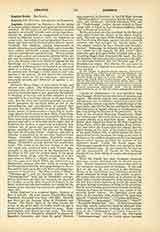

Lefebvre, CAMILLE, Apostle of the Acadians, b. at St. Philippe, P. Q., 1831; d. at St. Joseph, N. B., 1895. The son of sturdy French-Canadian peasants, he attended the village school and academy until he was seventeen, became a primary teacher for several half-yearly terms, prosecuted his study of Latin at St. Cyprien, and in 1852 entered the Congregation of the Holy Cross, at St. Laurent, near Montreal. Ordained priest in 1855, he served successively as curate at St. Eustache and St. Rose, professor at St. Laurent College, and missionary in the Diocese of St. Hyacinth, this last office coming to him as the natural result of his quite exceptional ability as a pulpit orator. His real life work, however, began only in 1864, when, in accordance with an agreement between his religious superiors and Bishop Sweeney of St. John, he took charge of the principal Acadian parish, Memramcook, N. B., and forthwith began the foundation of St. Joseph‘s College. Half a century ago, the French Acadians of New Brunswick, Nova Scotia, and Prince Edward Island were admittedly an unimportant factor in the social life and polity of those provinces. From the time of the great expulsion in 1755, they had been constructively deprived of all means of instruction, in public, professional, or even commercial life; in consequence, an Acadian name rarely if ever became prominent. Unquestionably looked down upon by their English and non-Catholic neighbors as a race naturally inferior to Anglo-Saxons and Celts, they apparently acquiesced in the fate that doomed them to be mere hewers of wood and drawers of water. With the advent among them of Father Lefebvre and the establishment of St. Joseph‘s College, there dawned a new era, and in the brief space of three decades there was wrought a veritable transformation.
Thanks mainly to his initiative, his personal service, and the enthusiasm with which he imbued his fellow-workers in the college and the leaders of the people themselves, Father Lefebvre lived to see the practical servitude and inferiority in which he found the Acadians replaced by genuine equality and freedom. In ever-increasing numbers his students took prominent places in the business, educational, or professional world, gave themselves to the altar or pleaded at the bar, entered the provincial legislative assemblies and the federal parliament, and graced the bench of the Supreme Court. From 1864 to 1875 the “Apostle of the Acadians” encountered trials, reverses, and difficulties which nothing but indomitable energy, coupled with unwavering confidence in God, could have enabled him to survive. During these years, in addition to his duties as college president and pastor of Memramcook, he preached missions throughout Acadia, served several terms as Provincial of his Congregation, founded the Little Sisters of the Holy Family, and was honored with the degree of Doctor of Divinity by Laval University and the title of Apostolic Missionary by Pius IX. His death occurred in January, 1895; and within two years St. Joseph‘s Alumni erected at Memramcook in his honor a handsome stone edifice, the Lefebvre Memorial Hall. “After God“, says his Acadian biographer, “he loved especially the Congregation of the Holy Cross and the Acadian people. He is perhaps the purest glory of the former; he is certainly the greatest benefactor of the latter.”
ARTHUR BARRY O’NEILL

